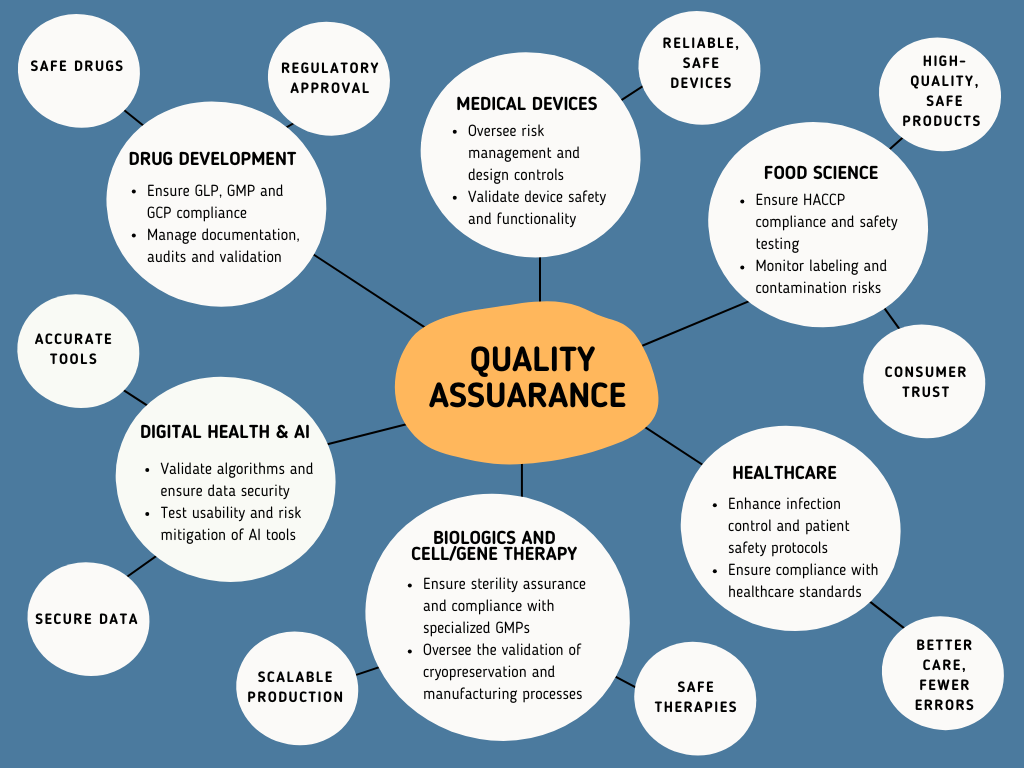Quality assurance (QA) plays a vital role across industries like life sciences, food, medical devices and healthcare. QA ensures that products, systems and processes meet stringent standards for safety, efficacy and compliance, safeguarding consumers and elevating industry standards. From life-saving drugs to ensuring the food we consume is safe, QA’s impact is far-reaching.
QA, quality control (QC) and regulatory roles often overlap but serve distinct purposes. QA focuses on maintaining and improving processes to prevent defects, QC addresses defects in final products and regulatory roles ensure compliance with laws and guidelines. Together, they form the backbone of quality and compliance within these industries.
In the US, QA professionals require a solid understanding of regulatory frameworks like Good Manufacturing Practice (GMP), International Organization for Standardization (ISO) standards and the US Food and Drug Administration (FDA) guidelines. Skills in risk management, documentation and tools like Corrective and Preventive Actions (CAPA) are crucial to success.
Innovations like wearable tech and personalized medicine continue to drive growth in healthcare and medical devices. Meanwhile, the food industry’s focus on sustainability and transparency creates opportunities for QA experts to enforce quality standards and ethical practices. QA is a career that shapes industries and impacts lives (Figure 1).
Here’s a look at the top five QA jobs in these industries, including what a typical day entails, the skills required, pay ranges for 2024 and tips for transitioning into these roles.
Be sure to explore the Xtalks Job Search platform to take the first step toward securing your dream QA role today.

Quality Assurance Specialist
A Day in the Life
QA Specialists focus on specific aspects of quality systems, including reviewing batch records, analyzing non-conformance trends and validating CAPAs. Routine tasks include compliance checks and documentation reviews.
- Example: A QA Specialist at a food production plant might review supplier audit reports to ensure incoming raw materials meet safety and quality standards.
Background, Skills and Know-How
A bachelor’s degree in science or engineering is often required. Attention to detail, organizational skills and knowledge of GMP guidelines are critical. Familiarity with tools like Systems Applications and Products in Data Processing (SAP) Quality Management can be an asset.
Salary Range in 2024
Salaries for QA Specialists range from $60,000 to $70,000 annually, with opportunities for growth in specialized fields like biologics or sterile manufacturing.
How to Approach the Quality Assurance Specialist Role
Internships or entry-level QA positions provide a solid foundation. Building expertise in specific systems or processes and obtaining certifications can accelerate your career.
Quality Control Analyst
A Day in the Life
Quality Control (QC) Analysts test and analyze products to ensure they meet safety and quality standards. Daily tasks include performing lab tests, documenting results and collaborating with research and development (R&D) and production teams to address defects.
- Example: For instance, a QC Analyst at a biologics company might test batches of monoclonal antibodies using high-performance liquid chromatography (HPLC) to ensure they meet potency and purity standards before distribution.
Background, Skills and Know-How
A bachelor’s degree in chemistry, biology or a related field is typically required. Strong attention to detail, lab skills and proficiency with analytical instruments like HPLC or gas chromatography (GC) are essential.
Salary Range in 2024
Salaries for QC Analysts range from $60,000 to $88,000 annually, with higher pay in biopharma or specialized testing labs.
How to Approach the Quality Control Analyst Role
Begin with lab internships or technician roles to gain hands-on experience. Building expertise in specific testing methods and regulatory environments can help accelerate a career in this area.
Quality Assurance Manager
A Day in the Life
A Quality Assurance (QA) Manager oversees teams that implement and maintain quality systems. Daily activities might include reviewing compliance reports, leading internal audits and strategizing process improvements. Regular meetings with production, R&D and regulatory teams ensure alignment with quality objectives.
- Example: A QA Manager in a pharma company might oversee the implementation of a new Quality Management System (QMS) to streamline compliance with global GMPs.
Background, Skills and Know-How
A bachelor’s degree in life sciences, engineering or a related field is typically required, though advanced degrees can help. Strong leadership skills, knowledge of regulations like FDA standards and ISO 9001 and familiarity with tools such as Six Sigma are essential.
Salary Range in 2024
QA Managers can expect salaries between $95,000 and $110,000 annually, with medical device and pharmaceutical sectors offering higher compensation.
How to Approach the Quality Assurance Manager Role
Start by gaining experience in entry-level QA roles or regulatory affairs. Pursuing certifications like Certified Quality Manager (CQM) or ISO Auditor Training can boost chances of moving into management.
Validation Engineer
A Day in the Life
Validation Engineers ensure systems, equipment and processes perform as intended. Their tasks include writing and executing protocols for installation qualification (IQ), operational qualification (OQ) and performance qualification (PQ). Collaboration with production and QA teams is routine.
- Example: A Validation Engineer in a medical device company might validate a new production line for pacemakers, ensuring the equipment operates reliably under all conditions.
Background, Skills and Know-How
A degree in engineering or a related technical field is essential. Analytical thinking, problem-solving skills and familiarity with validation standards like ASTM International (formerly known as the American Society for Testing and Materials) E2500 are crucial. Hands-on experience in validation is often required.
Salary Range in 2024
Validation Engineers can expect salaries ranging from $94,000 to $105,000 annually, depending on expertise and industry.
How to Approach the Validation Engineer Role
Start with roles in technical manufacturing or QA to gain hands-on experience. Certifications like Certified Process Validation Professional (CPVP) can enhance qualifications.
Compliance Manager
A Day in the Life
Compliance Managers ensure adherence to regulatory standards. Their responsibilities include reviewing policies, conducting risk assessments and managing audits. They often liaise with internal teams and regulatory agencies.
- Example: For instance, a Compliance Manager in a digital health company might ensure that a mobile health app complies with the Health Insurance Portability and Accountability Act (HIPAA) regulations for patient data security.
Background, Skills and Know-How
A bachelor’s degree in law, life sciences or business is common. Certifications like Certified Regulatory Compliance Manager (CRCM) and project management skills are highly beneficial.
Salary Range in 2024
Compliance Managers earn between $83,000 and $155,000 annually, with top salaries in healthcare and medical devices.
How to Approach the Compliance Manager Role
Experience in QA or regulatory affairs is a common pathway. Building a strong network in compliance and staying updated on regulations are key to transitioning into this role.
With increasing regulatory scrutiny and rapid technological advancements, QA jobs are thriving. According to the US Bureau of Labor Statistics, employment for software developers, QA analysts and testers is projected to grow 17 percent from 2023 to 2033.
Whether one is leading teams, validating processes or ensuring compliance, QA professionals have the opportunity to shape industries and safeguard lives. With competitive salaries, diverse career paths and the chance to work on innovative projects, a career in QA is both fulfilling and impactful.












Join or login to leave a comment
JOIN LOGIN